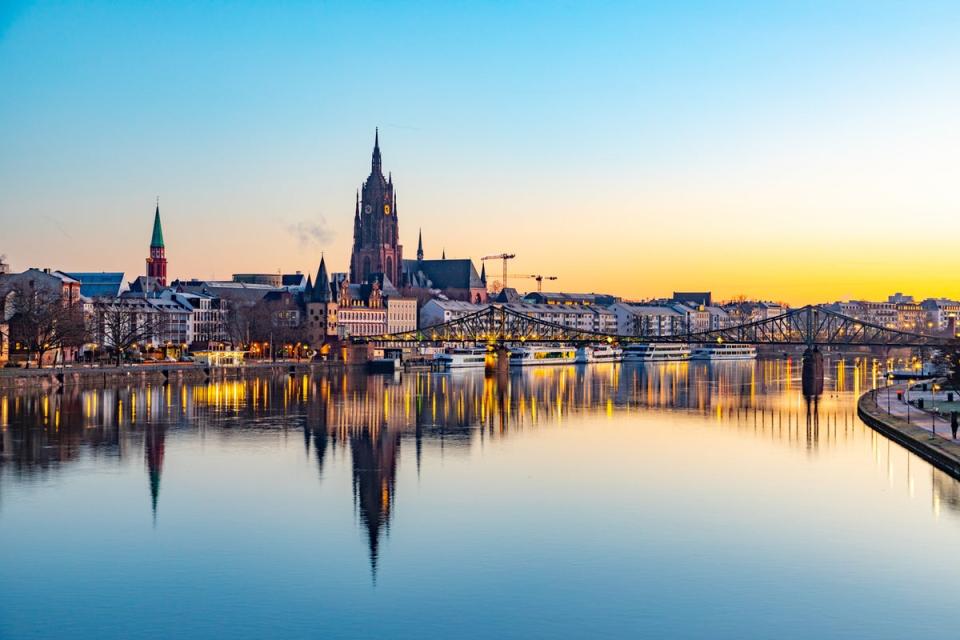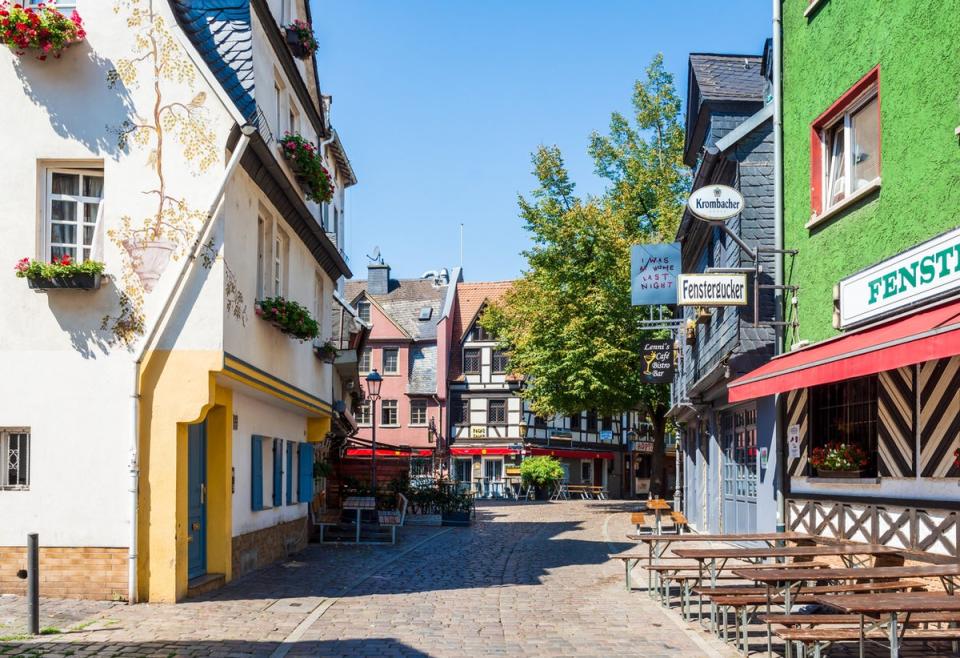Some may consider this German city to be the most boring Euro 2024 host – but it’s actually a cultural marvel

Frankfurt? Isn’t that one of the more boring Euro 2024 host cities – the one by the river Main with all the financial institutions and banks, a sort of German Canary Wharf with great cakes?
If you were watching the games thinking that this is the dull bit of Deutschland, then reconsider. Frankfurt has world-class museums and galleries and the cultural mix that comes from being one of Germany’s most diverse cities. As well as dramatic football, get ready for Botticelli, Turkish food and cool hotels. Prepare, also, for a city determined to dispel any suggestion it isn’t exciting.
This is most obvious around Alt-Sachsenhausen, the area south of the Main River where the cobbled medieval lanes are full of bars and, come evening, the atmosphere is a combustible cross between York and Magaluf. All tremendous fun if you are inclined to be boisterous but if your tastes are a little edgier then seek out the bars in the Bahnhofsviertel area, the streets immediately around the immense Neo-Renaissance front of Frankfurt railway station.
If that’s too edgy for you then slip into Wiesenhüttenplatz, where each evening Yok Yok Eden, one of the city’s buzziest open-air bars, spreads its tables under a canopy of trees.

If you’re planning a few jugs of Frankfurt’s deceptively strong take on cider, Apfelwein, you’ll need to eat. Head for the parallel avenues, Kaiserstraße and Münchener Straße, that run from the station east to the ‘new’ opera house – one of the city’s many handsome chunks of under-appreciated post-war modernism. On Kaiserstraße you’ll find plenty of modern European food options but cross over to Münchener Straße and you enter a world of Turkish and middle-eastern cafes and restaurants.
Look up above the street for more entertainment – Frankfurt, nicknamed Mainhattan, is hooked on rooftop drinking. There are bars on top of museums and apartment stores, you can even drink in rooftop bars that are overlooked by rooftop bars. There’s a great relaxed space above Gekko House, a chic boutique hotel that comes with a Chicago style-grill restaurant, where customers can cast their eyes up from their post-BBQ whisky sour to the Skybar, a circular terrace 199 metres above at the top of Tower Number One. It’s tall but not the tallest – that title belongs, by 100cm, to the 200-metre Main Tower. Its viewing platform doesn’t serve alcoholic drinks; perhaps wisely, as there are dizzying views of the Taunus mountains and the city below.
Read more on Germany travel:
Fans of far shorter buildings should squeeze into the restored AltStadt medieval quarter, between the ornate Romër city hall and the cathedral. Things will be busy around The House of the Golden Scales, a honey pot for Instagrammers and an outpost of the city’s knock-out Historisches Museum. Its completion in 2018 was the last act of the quarter’s rebuilding. Sadly, for lovers of Brutalism, the AltStadt work required the destruction of a gloriously bleak postwar concrete car park, but five minutes’ walk away another mid-century gem has survived.
The Kleinmarkthalle food hall is a long glass, steel and brick wedge that went up in 1954. The stalls are packed with fresh produce and there are great bars and restaurants on the upper floor tucked into the angled roof. Frankfurters have long loved the Kleinmarkthalle and there are plans in place to preserve it for another 70 years.
They have reason to be serious about buildings in Frankfurt. Like so much else in the city, the home of 18th-century writer Goethe was destroyed by Allied bombing in 1944 and later rebuilt. The result, the Goethe House, is a convincing simulacrum but don’t spend too much time considering what might have been the great man’s chamber pot. The real attraction here is the sensational 1921 Deutches Romantik Museum that comes attached. The pale-yellow exterior of curves and flat planes contrives to suggest both Bauhaus and Jugendstil. The interior offers many square metres of rough-to-the-touch concrete walls lined at one end with hundreds of books – this is the epitome of hip architecture.

You’ll find the hotel world’s take on hip at Roomers just across Gutleutstraße from Wiesenhüttenplatz. It’s all darkened interiors and plush rooms with the promise of pleasurable encounters, though my most exciting interaction was with some zingy yellowtail mackerel in the hotel’s excellent in-house pan Asian-Californian restaurant Burbank. The tables look out on a courtyard that becomes one of the city’s best open-air bars in the evenings. The inside bar stays open until 4am but if you want to party on, each of the 116 bedrooms comes with its own Marshall sound system.
Few cities have a better environment for the slightly hungover than Frankfurt, and most of them are on the southside of the Eiserner Steg iron footbridge to the Museum Embankment. Here the imposing Städel Museum is home to a pretty astonishing permanent collection featuring Vermeer, Monet, Degas, Dürer, Reubens and Van Eyck. Spending a few restful moments with Botticelli’s Idealised Portrait of a Lady is as effective as two paracetamol.
Close by is the Liebieghaus museum, a 19th-century Brothers Grimm castle filled with ancient, medieval and renaissance sculpture. The inhouse cafe spreads onto the lawn where this visitor laid down his head. So Frankfurt, not boring at all. Though, to be fair, there is quite a lot of cake.
Michael Hodges stayed in Frankfurt as a guest of Roomers and Gekko House.
Read more on under-the-radar destinations to visit in Europe


